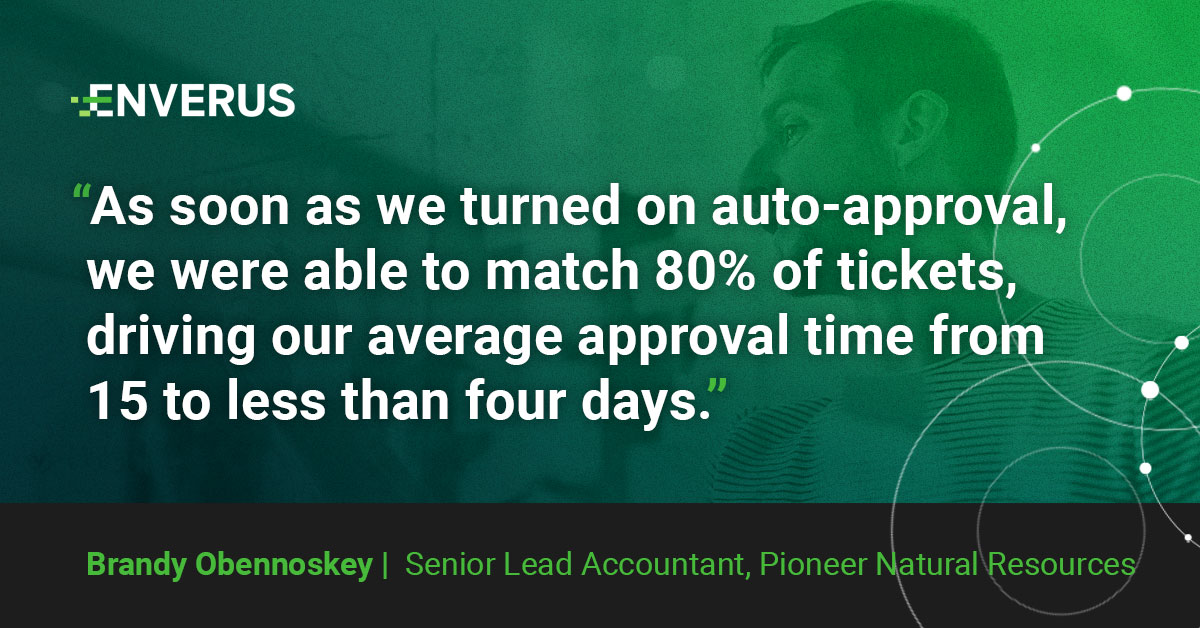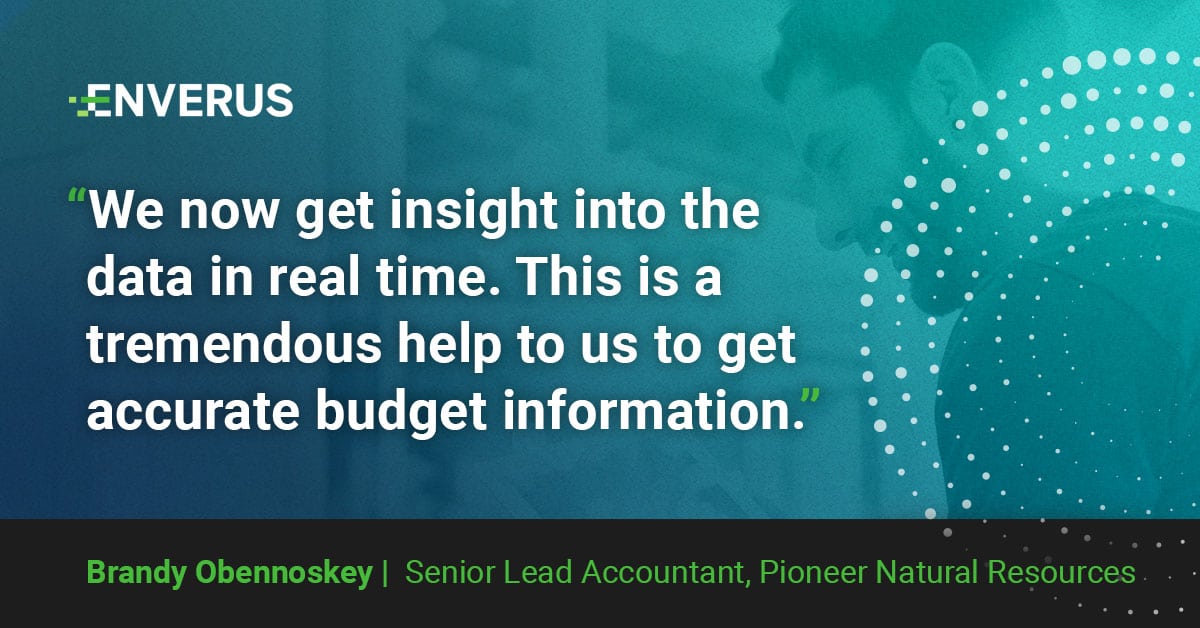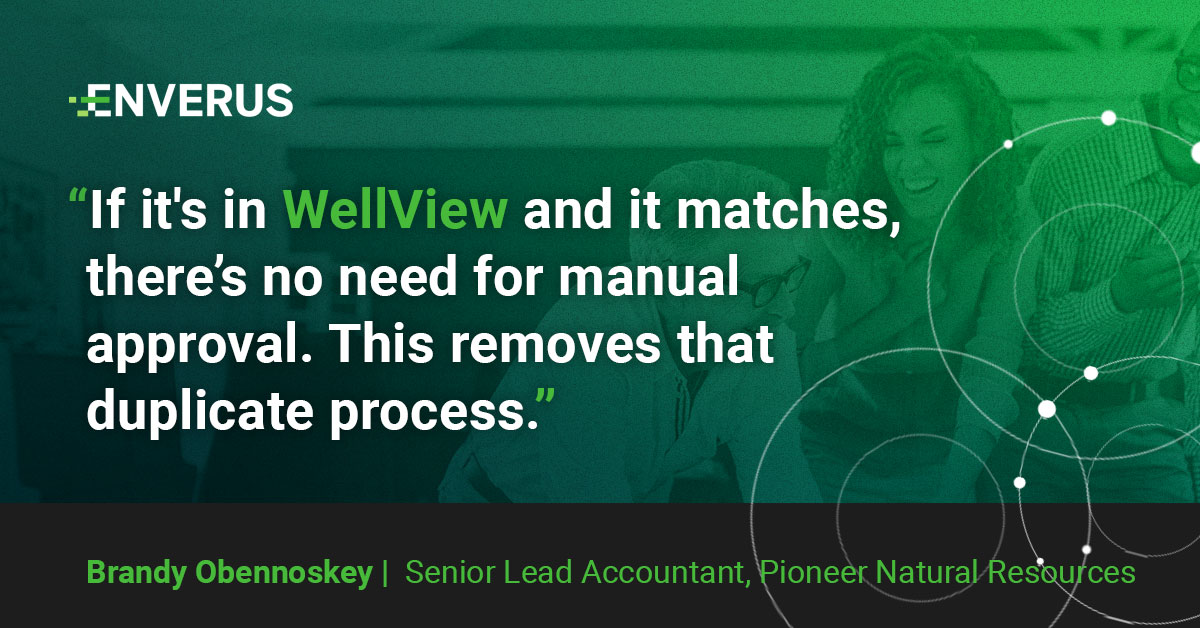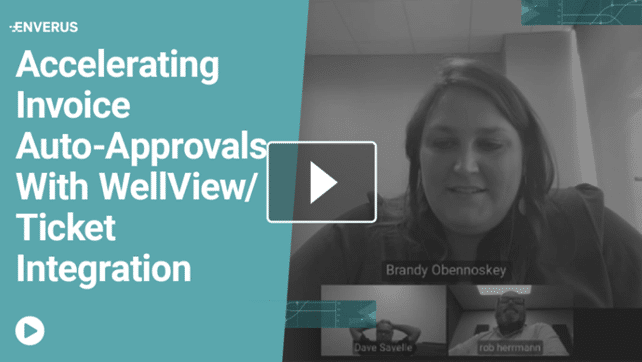An interview with Pioneer Natural Resources
Pioneer Natural Resources (PNR), an operating company with assets in the Permian, is constantly striving to find new ways to drive efficiency in its operations and capital management.
Automatic field ticket approvals are one way the company saves significant time with field operations. By integrating Enverus OpenTicket with WellView morning reports, PNR’s drilling engineers focus only on tickets that do not match morning report data.
In this interview with Brandy Obennoskey, senior lead accountant at PNR, we discuss how Enverus has helped PNR save time and improve cost management.
Enverus: How does Pioneer Resources automate ticket approval using WellView morning reports?
Brandy Obennoskey: There are two ways to do it. First, you can import data from OpenTicket, our digital field ticketing platform, into Peloton’s WellView application. This is a straightforward export of data generated by a supplier that’s entered into the cost estimate section of the WellView morning report. This works well if the supplier entered the information on the same day and time that the work is done. For a majority of suppliers, there’s a lag. You can also use the morning report information to automatically approve the field ticket. This is how we do it. The field supervisor enters the cost estimation in the morning report and sends it to the office as part of the daily operation’s routine. The information is then exported into OpenTicket. You can automatically approve that field ticket if the ticket matches the morning report.
Enverus: How did Pioneer shorten approval times and reduce manual approvals by pushing the WellView data to OpenTicket?
BO: Our suppliers were being asked to submit tickets into OpenTicket faster. Their feedback to us was they were still seeing a lag in approvals. So, we looked at what we could do to assist our approvers. We realized approvers were manually validating the data from WellView, pulling up OpenTicket and eyeballing it to make sure the data matches before approving it. That’s what led us to this integration. In Q2 2021, we took a daily report from WellView and started matching it up manually against our OpenTicket data with the intention to help our approvers quickly identify which exceptions they needed to review. As soon as we turned on auto-approval, we were able to match 80% of tickets, driving our average approval time from 15 to below four days.

Enverus: How did Pioneer roll the automation out?
BO: In the first few months, we did a manual gut check on the automation with a subset of WellView data. We chose data from our drilling site and pushed the data daily from WellView into OpenTicket. Our approvers could go in, filter everything that matched and easily approve those first. In April and May, we turned on the automatic approval process. It was a simple flip of a switch. All you have to do is go in and say everything that matches 100% is auto-approved. We saw a drastic improvement in our drilling invoice approval time. Our average time went from 15 days down to below four days. About 12% of the volume became automated instantly.
Enverus: How has the integration of WellView and OpenTicket helped Pioneer better manage budget costs?
BO: We now get insight into the data in real-time. Before, this data analysis happened within a three- or six-month timeframe. Getting a feel for that data has been a tremendous help to us as far as getting accurate budget information.

Enverus: Did you set dollar parameters for the invoices that could be automatically approved?
BO: We focused on the low-cost invoices. Some of our approvers handle anywhere from 500 to 600 approvals at a time. That’s a heavy load on them, especially when we know the data is already in our morning report system. So, we gave them this option — if it’s entered into WellView correctly, it’s timely and it matches, then there’s no need for manual approval. This removes that duplicate process.

Enverus: How does PriceBook and WellView compliance on a ticket aid in automating approvals?
BO: We heavily use PriceBook. So, we really drive home that the validation and purchase category coding with our price books is populating that coding. This also matches in WellView. We find that both price book compliance and WellView compliance back the reasoning for automating approvals.
Enverus: What type of tolerance do you support in the ticket match?
BO: The key match for us is ticket number and GL code. Lucky for us, entering the ticket number was already in our WellView process, because the ticket number gives assurance from an audit perspective as OpenTicket has a duplicate ticket check functionality. GL code was important because it gave our drilling team confidence that the match between the two systems is consistent and accurate. We decided on a $1 amount and a 15-day service date for tolerances. I would say again since we’re already matching on that ticket an amount at a dollar range in the GL code. For the 15 days service date, we wanted to get the highest percentage match within comfort. After looking at the percentages from a reporting perspective, it got us to 80%.
Enverus: What was the supplier experience like? How did you inform them there was going to be a new process?
BO: Our suppliers noticed it immediately on their own. The feedback we got was that we’re being asked to submit faster in OpenTicket, but we see a lag in approval. It’s cool to see from a functional perspective of pulling up the log and seeing the ticket was submitted and it was approved by us. The only lag left is that invoice flip time. From there, it’s a no-touch invoice. From our perspective, we’ve been able to do as much as we can from a timeliness perspective. It’s up to the supplier and their submission time. I will say that submission time has gone down now that they know they can get that instant approval.
Watch the on-demand webinar featuring this conversation here.
Enverus: As more suppliers use mobile field ticketing, do you think submissions could be done faster, where you could take field ticket information from a mobile device and put it directly into WellView, without needing the WellView-to-digital ticket reconciliation?
BO: Absolutely. That’s constantly on our minds. From our perspective, we’ve removed every touchpoint from our side. What’s left is that manual entry into WellView. There are some tickets already coming in from OpenTicket faster than WellView. The hardest piece for our industry is it depends on the service type. Communication both ways is necessary. So if we can get that OpenTicket data first, let’s feed it into WellView data and vice versa. Really, the ultimate goal is just to remove the duplicate process between the two systems.
Enverus: Have you also shortened your payment terms for vendors to get paid for submitting quicker?
BO: Now that we have this in place, we are taking the early payment programs quite heavily compared to what we used to be able to do. As operators pivot away from asset acquisition to developing and optimizing existing assets, improving drilling and completion operations is critical. PNR’s innovative thinking is one example of the many opportunities still available for operators to improve time and cost efficiency through process improvement and automation.
Ready to save your drilling and completion engineers time with automatic ticket approvals? Fill out the form to learn more today.








